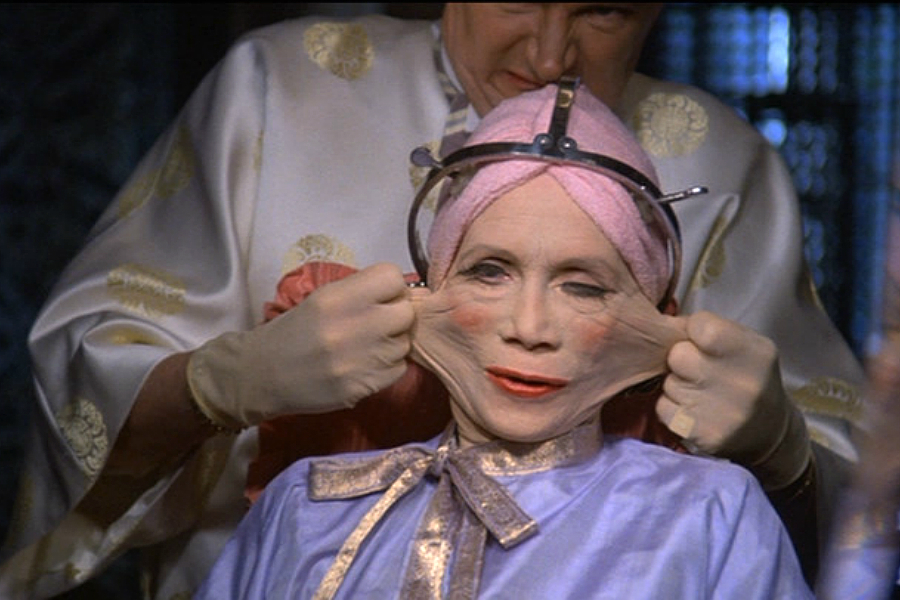Brazil – Previewed

Nik Glover deconstructs Terry Gilliam’s dystopic bureaucratic nightmare, Brazil…
On the surface, Terry Gilliam’s Brazil (1985) has nothing whatsoever to do with its new world economic powerhouse namesake, which perhaps makes it an odd choice to be screened for The Humble Market, FACT’S programme of Brazil-inspired events and exhibitions. However, any excuse to enjoy Gilliam’s most successfully realised social surrealism piece on the big screen is good enough for me.
Evoking a hyper-bureaucratic world not far removed from that of The Apartment (1960) but filtered through the lens of a Quixotic chase-nightmare, Brazil represents one of Gilliam’s many labours of love, and the first in which external pressures almost drove him insane (a not uncommon experience for the former Python). The film languished without an American release for months, with Universal refusing to sanction its original, pessimistic ending.
It was only through Gilliam’s partisan activity, and the first stirrings of an extremely favourable critical reaction, that the film secured a US release as delivered. This was the first of Gilliam’s many production nightmares, but unlike The Imaginarium of Dr Parnassus (2009) or The Adventures of Baron Munchausen (1988), these problems did not negatively affect the final product.
In a dystopian future city, the actions of a nameless office worker in killing a troublesome fly sets off a chain of events that will inadvertently almost bring about the fall of an entire society. In a neurotic chase scene that parallels the narrative to come, said worker hunts down and kills the fly with a satisfied grin, only for the offending insect to fall into his computer and cause a glitch. The simple act of mistaking one letter in a name for another will have very real consequences for this society’s underclass and for our hero.
As the film opens, Sam Lowry (Jonathan Pryce) is a mid-level clerk in one of a dizzying number of government departments, cursed with an overbearing, vicariously ambitious mother (Katherine Helmond) and a problem with his apartment’s plumbing. Sam’s world is driven by bureaucracy and form-filling, with the underlying threat of hideous torture for anyone who resists the decrees of the Ministry of Information (one central scene has a cheerful secretary typing up a live feed from a torture chamber, complete with garbled screams and desperate pleas from the victim of ‘Information Retrieval’).
Orders arrive via pneumatic tube – every element of the administration carries a human sense, disembodied from the whole, and seemingly blind, deaf or dumb to its own purpose. Throughout the film, Gilliam’s dream sequences transport Sam into the winged armour of a knight, battling against cowelled figures inside a labyrinth of grey columns. These double narrative threads feed into and inform each other.
Sam Lowry enters onto a crusade, but he is not a freedom fighter in the way Robert De Niro’s SAS plumber is – he does not so much stand against tyranny as rail against ‘bad’ bureaucracy of the kind that he sees unfold as a result of the fly-swatting incident. For a hero, he is remarkably callow, a likeable but cowardly figure who alternates between comfortable mediocrity and blind panic (when asked why he doesn’t ‘do something’ about the frequent anti-establishment bombings that occur throughout the film, he replies with a smarmy: “It’s my lunch hour”).
Brazil is constantly compared to 1984 and to Kafka’s The Trial, in that it features a protagonist trapped by systems. I would argue that in its displacement of the heroic impulse onto other, mostly faceless bit-part players, it is more interested in the secret society Sam impinges on and unknowingly endangers. The violent death of the resistance echoes The Battleship Potemkin (1925) in form and feeling.
Gilliam creates his dystopia from a nostalgic distortion of post-war England. His computers are specifically made to look outdated (even for 1985), with tiny viewing screens magnified by semi-transparent plastic add-ons, as if austerity dictates that only the very least amount of money should be spent on the apparatus of bureaucracy. Print outs appear on reams of paper, echoing the always prevalent ‘ducting’, which often takes on a life of its own. Gilliam is keen to hammer home the feeling that this society is powered by a very real, and frequently vindictive beast, hiding somewhere just beneath the grey-panelled surface.
The beast is inhabited by many human avatars, including Ian Richardson (later the civil servant to end all civil servants, literally, from the BBC’s The House of Cards) whose enforced marches through the corridors of power followed by a crowd of subordinates welcome Sam following his promotion. Ian Holm’s sniveling Kurtzmann, the paranoid, grasping boss who loses Sam to promotion, appears in Sam’s dreams as a humanoid wall that grips his legs as he tries to flee.
Michael Palin appears as an affable version of his usual, globe-trotting self, only to become one of the very worst specimens on display. Palin should have been Oscar-nominated for his turn – instead it seems that the distraction of bigger stars in odder roles, and the controversy around its release restricted the film to nods for Original Screenplay and Art Direction.
The Humble Market exhibition and events programme imagines a globe dominated by Brazil, but also a Brazil dominated by our own ideas of what makes an economic superpower. Thus, carnivalia and a taxi passenger-eye view of shanty towns spread beneath pin-needle skyscrapers mixes with pollution, future tech and increased social stratification. The nightmare of Gilliam’s film, set ‘Somewhere in the 20th Century’, is that all of the structures we create to fight chaos and disorder are in themselves cursed to become irrational and destructive, once the first glitch occurs.
As in The Terminator (1984), systems that we create to defend or support the way we live now might have very different ends when they are allowed to play out to their natural conclusion. The film’s title, and thus its inclusion in the exhibition, comes from the recurrent theme ‘Aquarela do Brasil’ (Watercolour of Brazil) and is seemingly entirely random; yet the film’s spirit sits remarkably well with concerns surrounding how its real world counterpart will develop.
Nik Glover
Brazil screens 14th August 6.30pm @ FACT as part The Humble Market: Trade Secrets exhibition





